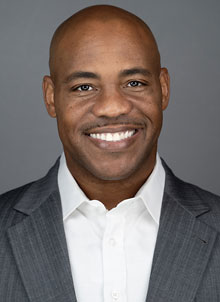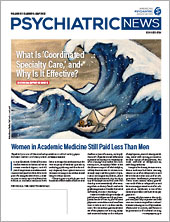From helping to launch the election campaign of the 44th president of the United States to serving as his advisor to implement one of the biggest expansions of health coverage in U.S. history, Anton Gunn, M.S.W., knows a thing or two about leadership.
Gunn’s latest book, The Presidential Principles: How to Inspire Action and Create Lasting Impact, is based on his experiences with Presidents George H.W. Bush, Bill Clinton, George W. Bush, and Barak Obama. Gunn found striking similarities among these leaders. At APA’s 2022 Annual Meeting keynote presentation at the Opening Session on Saturday, Gunn hopes to inspire psychiatrists to become more socially conscious leaders, too.
What is socially conscious leadership? Gunn explains the concept this way: “We’re aware of our own circumstances and those of our closest associates but can be blind to the injustices and unfairness that happen to other people who are right before our very eyes,” Gunn told Psychiatric News. “I think that the greatest responsibility of leaders is to put themselves in a position where they are constantly uncomfortable and more aware of what’s happening around them. … This involves surrounding yourself with people who are different than you, who think and act differently, who ask different questions than you would, and who understand the world in a different way.”
This practice, he said, will help bring to leaders’ consciousness what they might otherwise miss, allowing leaders to take action. “You can’t fix what’s wrong until you know what’s wrong,” Gunn said.
What might psychiatrists be overlooking? Gunn said clinicians are understandably focused on meeting patients’ mental, emotional, and behavioral health needs. Yet whether or not patients have transportation to their appointments, a pharmacy in their neighborhood, and a family or social support system for their treatment plan may be just as important as the services a clinician provides.
“Part of being a socially conscious leader is understanding the social determinants of health and how individuals’ environment and circumstances, for example, the current job market, might impact their ability to get well. The other part is doing something about it. A lot of us know better, but we don’t do better,” Gunn said.
Advisor to Barak Obama
Earlier in his career, Gunn leveraged his experience as a community organizer to spearhead Barak Obama’s first presidential election campaign in South Carolina as his political director. Gunn is credited with galvanizing support, especially among Black voters, for the then-Illinois senator, helping to launch his successful candidacy. Gunn went on to become the first Black man elected from District 79 to the South Carolina House of Representatives.
After being tapped for a leadership role by Obama two years later, Gunn served as the director of external affairs at the Department of Health and Human Services (HHS). He advised both Obama and then-HHS Secretary Kathleen Sebelius on how to overcome opposition to make the Affordable Care Act (ACA) a success. As part of that role, he helped design the outreach strategy that secured the critical enrollment of 7 million Americans during the program’s first few months.
“When all the naysayers were beating us up about the ACA, their benchmark was if we didn’t get 7 million people enrolled, it was not going to be a viable public program,” he said. “We achieved —even exceeded—that goal.” Gunn noted that a record number of Americans—31 million—received coverage through the ACA last year, according to an
HHS report issued in June 2021. There have also been reductions in uninsurance rates in every state in the country since the law’s coverage expansions took effect.
Advocacy Work Is Key
Gunn urges psychiatrists as socially conscious leaders to engage in advocacy work at the local, state, and federal levels. “Are you solely concerned about the patient right in front of you, and once that person leaves your office or care setting, do you just move on to the next one? Or do you take the time to ask ‘What can I do to change the social determinants of health?’ ”
In that vein, Gunn urges psychiatrists to utilize the power that comes from the societal reverence afforded to physicians. “Their professional credentials and expertise in their field entitle them to a platform, a space to talk about issues, which they have not historically leveraged. … I can’t tell you the number of times when I was working on the ACA or other health care policies that there was not a single physician in the room. … The clinicians were absent from those conversations because they had yielded their power.”
Gunn believes that socially conscious leadership extends beyond merely advocating with policymakers and government officials. “When it comes to your neighbors, friends, people that you work with or worship with, former college classmates, have you asked them to get involved? What do they know about what you do every day and the challenges you see? This is about using use your platform of leadership and influence to inspire and empower others to pick up causes that are important to you and the profession.”
Over the past two decades, Gunn has seen a lessening of the stigma surrounding mental illness, substance use, and its treatment. “But there is a long way for us to go for people to be OK with talking about this,” he added. “Does the average citizen understand what bipolar disorder or schizophrenia is or what the symptoms and signs are? A big part of the challenge is that most of us don’t understand any these illnesses of the mind at a level to be helpful to our friends, our family, and the people in our community.”
Psychiatrists have key roles to play in demystifying serious mental illness for the public, as well as conveying the challenges the mental health care system faces, Gunn said. “Are you blogging, are you writing, do you comment on social forums and social media? Outside of the academic practice setting, are you taking the opportunity to share with young people the importance of getting treatment? Those are some of the things that we have to do to normalize [mental health treatment] and remove the stigma.” ■
Anton Gunn will be speaking at the Opening Session on Saturday, May 21, at 5:45 p.m.

